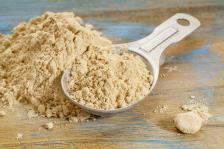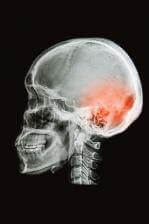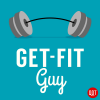Tips to Reverse Brain Aging and Get Smarter
Cognitive impairment is part of the aging process. but it doesn’t have to be! Get-Fit Guy has tips on how to care for your cranium and prevent disabling nerve damage.
Ben Greenfield
Listen
Tips to Reverse Brain Aging and Get Smarter
The recent winter Olympics featured a plethora of head injuries, concussions, and nasty falls, including this cracked helmet snowboard accident. After experiencing multiple concussions myself from activities such as downhill mountain biking and playing backyard football without a helmet (not recommended!), I can’t help but cringe when I see athletes go down hard on or near their head..
Brain injuries are also extremely common in American professional football players, which has lately created enormous controversy over who is responsible for the early onset of Alzheimer’s and other serious cognitive impairment issues being experienced by both current and retired NFL players.
But the fact is that you don’t need to hit your head hard to get brain damage. The normal aging process is associated with diminished blood flow to the brain, which is known as hypoperfusion and causes cell injury, early onset of Alzheimer’s, and cognitive impairment very similar to a head injury, with no helmet cracking required.
So if you want to think better, improve blood flow to your brain, and generally care for your cranium, this episode is for you!
How Your Brain Gets Damaged
Tiny capillaries in your head surround neurons and deliver oxygen and nutrients into the brain. Any interruption to this capillary blood flow can injure or kill your neurons, causing both nerve damage as well as restricted blood flow. This type of interruption is known as hypoperfusion, and must be prevented or fixed to preserve cognitive function.
So how do hypoperfusion and nerve damage occur? Some of the major contributing factors are:
-
Getting hit in the head or knocked unconscious, which creates trauma, inflammation, and swelling that restricts blood flow and damages nerves.
-
Any type of heart surgery in which fat globules released during surgery can travel to the brain and cause clots or low blood flow.
-
Aging, during which veins thicken and capillaries degrade, especially in the presence of a poor diet and low amounts of exercise or mental activity.
-
High levels of blood glucose or intake of inflammatory foods such as vegetable oils, processed sugars, commercially raised meats, or foods to which you might be intolerant or allergic.
For more details on the mechanisms behind how each of these issues can affect your brain, I’d recommend reading this excellent article from the Life Extension Foundation.
How to Increase Blood Flow to Your Brain
So how can you increase blood flow to your head, reverse brain damage, and halt cognitive decline that occurs with aging? Here are 3 Quick and Dirty Tips to reverse brain aging and get smarter:
Tip #1: Take Nutrients that Support Your Brain

- nutrients to enhance blood flow (ginkgo and vinpocetine)
- nutrients for neurotransmitters, specifically acetylcholine, an organic molecule that acts as a neurotransmitter (via acetyl-l-carnitine and huperzine A)
- nutrients for increased antioxidant activity (alpha-lipoic acid and n-acetyl-cysteine)
At the end of this episode, I’ll give even more specific recommendations for dosages and sources of these nutrients, as well as some extra nutrients that may help with nerve repair as well.
Tip #2: Exercise

Tip #3: Play Brain Games
There is continuing research that playing “brain games” and doing brain aerobic exercises (like Sudoku) can help to “age-proof” your brain and slow the onset of aging symptoms. It can also help to keep your brain functioning at peak capacity. To qualify as a good brain aerobics exercise, an activity must have three distinct elements: novelty, variety, and challenge.

In other words: Make your brain lift heavy stuff.
One of my friends, Dr. Arlene Taylor, has a bunch of completely free brain aerobic exercises on her website.
You can also go do a search in the Apple iTunes store, or any other app store, for “brain exercises” and find good apps that will challenge your brain (Angry Birds probably doesn’t count). Two of my favorites are the Brainscape app, which allows you to create your own flash cards and learning activities which you can easily access from your phone, and n-Back training, which involves memorizing a progressively more difficult sequence of colored squares.
Incidentally, if you play a sport in a way that causes you to think ahead and solve problems as you go, that definitely challenges your brain. Activities such tennis or golf fit into that category – as do board games like chess and checkers.
More Brain Strengthening Resources
If you want even more resources and targeted recommendations, you may want to listen in to a recent BenGreenfieldFitness podcast episode in which I discussed in detail How to Heal Head Injuries Fast.
In that particular episode, some of the nutrient fixes I recommended for addressing blood flow issues to the brain and nerve damage from concussions or head injuries included:
1000mg curcumin
- 300mg alpha lipoic acid
- 20mg resveratrol
- 600mg acetyl-l-carnitine
- 150mcg huperzine-a
- 15mg vinpocetine
- 120mg gingko extract
Take these on empty stomach in morning, mid-morning, or mid-afternoon. Obviously, to piece all of these elements together requires purchasing a dizzying array of supplements and bottles, capsules, pills, powders. So if you want to make life easy, you can cover all of the bases by taking:
- 4 Phenocane
- 3 capsules Cognitex by Life Extension
when you wake up in the morning. And then
- 1 packet TianChi
in the mid-morning or mid-afternoon on empty stomach.
There are also supplements you can take to optimize nerve health or help repair nerves. For more information on why these nutrients work, read this article by neurosurgeon Jack Kruse. These include
- 4g triglyceride-based fish oil – the best brands are Barleans, Pharmax, Green Pastures, or LivingFuel SuperEssentials (I take Superessentials with my first or last meal of the day)
Then, in the afternoon, I drop 6 drops of Nascent Iodine in a glass of water:
In evening before bed, I take 400-600mg of magnesium citrate by Natural Calm.
https://www.amazon.com/Get-Fit-Guys-Guide-Achieving-Ideal/dp/1250000882In addition, remember to avoid inflammatory foods, including:
- Vegetable oils
- Heated seeds and nuts
- Grain-fed meat and farmed fish
- High amounts of sugars, starches, and grains
If you have questions about fixing head damage and improving cognitive function, then leave your questions and join the discussion over at Facebook.com/GetFitGuy.
Brain injury and other images courtesy of Shutterstock.

 Getting hit in the head or knocked unconscious, which creates trauma, inflammation, and swelling that restricts blood flow and damages nerves.
Getting hit in the head or knocked unconscious, which creates trauma, inflammation, and swelling that restricts blood flow and damages nerves.
 1000mg
1000mg 